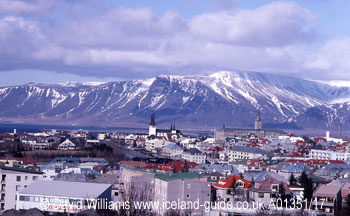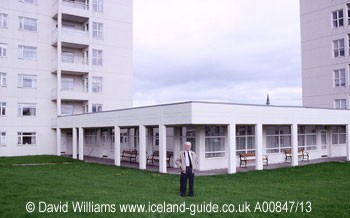 |
| This
winter view of Reykjavík has the mountain of Esja in the background. |
 |
| Bragi
outside the apartment block. The houses are in the tall buildings
and the communal areas are in the single-storey building. |
Iceland.
The very name conjures up thoughts of a cold and harsh climate on the
very north-western fringe of Europe. The name certainly rings true during
the winter — snow and high winds make living uncomfortable and in
the very hard winters more and more people make the decision to leave
the countryside and move permanently to the capital, Reykjavík.
Out of a total population of a quarter of a million, the city has one
hundred thousand people living in or near it, a concentration that cannot
be to the long-term benefit of the country.
However, Iceland is essentially a rural country; most families have connections
with farms and in summer many city-based children spend their holidays
with grandparents or other relatives on a farm. Although the people`s
links with the countryside are strong, the drift to the towns continues.
This has been especially the case with older people, and today 60% of
retired people live in the Greater Reykjavík area. However, recent
trends in caring for the country`s elderly, with special housing and more
health care in the smaller towns, have helped to slow down the depopulation
of the already sparsely-populated country districts.
I met Bragi Eiríksson at his home in Reykjavík. He had been
brought up in the important fishing settlement of Ísafjördur
in the North-western Fjords and had gone to college in Akureyri,
northern Iceland`s main town. Reykjavík, though, had been his home
for nearly forty years. For thirty years he sold stockfish (wind-dried
fish) to Nigeria, one of that country`s most important sources of protein.
Like many Icelanders, Bragi`s contacts with people outside the country
had given him the very opposite to the insular attitude you might think
the Icelanders would have, given their "isolation". And, like
many of his countrymen, he had a good command of the English language.
Five years ago Bragi and his wife Ragnheiður
Sveinsdottir (Icelandic women keep their own patronymic names after marriage)
sold their house and moved into an apartment block specially designed
for retired people. They have a one-bedroom flat (a spare room is used
as a study) with a spacious open-plan design. They had to dispose of much
of their furniture when they moved in, but they managed to keep some large
and very beautifully-carved wooden items. Paintings lined the walls of
the rooms and one wall of Bragi`s study had a huge bookcase crammed with
books — the Icelanders are avid readers. Ragnheiður`s
hobbies are painting china plates (a popular winter pastime) and tapestry
making and numerous examples of her work were displayed in the house.
Back
to the list of articles about this country
|

